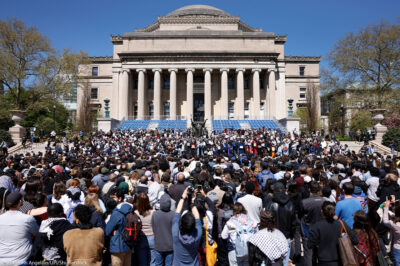In Victory for Free Speech on Campus, High Court OKs Mandatory Student Fees
FOR IMMEDIATE RELEASE
WASHINGTON, DC — In a vindication of one of the most important core principles of the First Amendment – protecting unpopular speech – the U.S. Supreme Court ruled today that public colleges and universities can use money from mandatory student fees to fund campus groups that engage in speech that some students may find objectionable.
Three self-described conservative students challenged the University of Wisconsin’s fee system, saying it violated their First Amendment free speech rights by requiring them to help finance organizations whose views they oppose, such as the Lesbian, Gay, Bisexual and Transgender Center. The American Civil Liberties Union filed a friend-of-the-court brief in the case.
In a unanimous ruling authored by Justice Kennedy, the court recognized that the fee requirement does not amount to “compelled speech,” but rather is a key element of the “important and substantial purposes of the university, which seeks to facilitate a wide range of speech.”
“This case was not so much about student fees as it was about the free exchange of ideas,” said Peter Koneazny, Legal Director of the ACLU of Wisconsin.
Matthew Coles, Director of the ACLU’s Lesbian and Gay Rights Project, agreed. “If the university had lost this case, the ability to form student groups and have robust debate on campus would have been subject to majority whim,” he said. “Today’s ruling is a significant victory for universities nationwide, for minorities and – most of all – for our nation’s time-honored commitment to the idea that free speech has to mean freedom of unpopular speech.”
Coles said the ruling also dealt a blow to organized efforts nationwide to silence lesbian, gay, bisexual and transgendered student groups. In recent years, right-wing organizations have mobilized nationwide to strip such groups of their university funding. Today’s ruling “stops these cynical attempts at censorship in their tracks,” Coles said.
The case is Board of Regents of the University of Wisconsin, et al., v. Scott Harold Southworth et al., (No. 98-1189).
The ACLU’s Coles participated in the case along with the ACLU of Wisconsin, with substantial input and assistance from ACLU cooperating attorney Jon Furlow of the Wisconsin law firm Michael Best & Friedrich.
A copy of the ACLU’s amicus brief in the case is available online at: http://archive.aclu.org/court/southworth1.html.
The Supreme Court’s decision is online at: http://supct.law.cornell.edu/supct/html/98-1189.ZS.html.
Stay Informed
Every month, you'll receive regular roundups of the most important civil rights and civil liberties developments. Remember: a well-informed citizenry is the best defense against tyranny.


